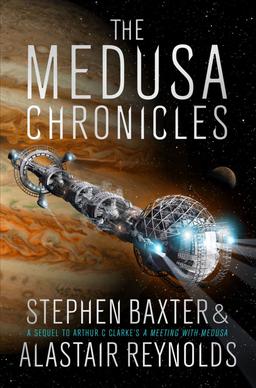I started reading this title in 2023 and only finished it recently.
It starts off quite nicely. The middle is a bit naïve, but passable. The action just before the epilogue is super original; I don't think I've seen anything like it in any other book. Both epilogues are quite alright, although the second one is, in my opinion, a bit too sugarcoated. But it does the job.
The book is a sequel to Arthur C. Clarke's 1971 novel "A Meeting with Medusa." Written by Baxter and Reynolds in tandem, it explores what might happen to our Earth civilization over the next few centuries if artificial intelligence became independent and decided to start exploiting space without us.
It also depicts what life forms might exist on Jupiter, under the pressure of a million atmospheres, in the environment of liquid hydrogen.
During the reading, the reader will visit several planets of the Solar System, from Mercury to the Oort Cloud. They will climb the highest mountain, survive a few moments inside the Sun, and walk in a special suit on the surface of Mercury, among other adventures.
Overall, it's quite a pleasant read. Baxter may not be a master of dialogue, but he makes up for it with ideas and very solid scientific foundations (he used to be an actual rocket scientist, and it shows in his books). This is something I've always appreciated in SciFi.
Overall - I recommend it. A solid 9/10.

Jeżeli chcesz do komentarza wstawić kod, użyj składni:
[code]
tutaj wstaw swój kod
[/code]
Jeżeli zrobisz literówkę lub zmienisz zdanie, możesz edytować komentarz po jego zatwierdzeniu.